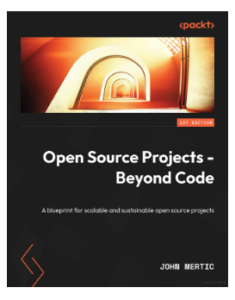John Mertic has an open source career spanning two decades – both as a contributor and a leader. Through his leadership he has helped push open source into new industries like animation and visual affects with the Academy Software Foundation and, of course, on the mainframe with Open Mainframe Project. He helped accelerate innovation with ODPi, R Consortium, LF Energy, LF AI and Data,SugarCRM and as a maintainer with the PHP project. With an extensive open source background, he is a regular speaker at various Linux Foundation and other industry trade shows each year and hosts a monthly video series with TechStrong TV.

It shouldn’t be a surprise that John has put pen to paper to share his experience and best practices with open source. In his newly published book, “Open Source Projects – Beyond Code,” he offers strategies to develop a successful, scalable, and sustainable open source project.
This book is for software developers, product managers, project managers, business leaders, or general enthusiasts looking to start an open source project or currently maintaining one.
We asked John a few questions about the book and his motivations behind writing this book.
Q: What motivated you to write this book?
There were two big motivators; the first is that with all the open source projects I work with across the Academy Software Foundation, LF Energy Foundation, and Open Mainframe Project, there were a bunch of common themes and topics I’d be talking with project leaders about. Writing this all down in a book gave me a reference I could point projects to before we would dig into the specific topics or issues they were having.
The second was that too often the focus on open source is the code itself. The reality is that the code is the easiest part of open source; everything else is the hard parts, including governance, marketing, contributor/maintainer management, and building a sustainable project. Writing a book that looked “beyond code” is a way to highlight that.
Q: What are some key takeaways readers should take away from the book?
First is that each project is different. The book often showcases multiple different examples of ways different projects approach a situation, which will help the reader understand the dynamics of the project. Readers will not per se walk away with clear cut answers, but will generally walk away with the right questions and thought patterns help them through their open source journey.
Second is that the work to build a sustainable project is both hard and intentional. Specifically in the chapters where I talk about growing contributors to maintainers and transitioning leadership; that process for a project is one that doesn’t happen overnight. The book gives the reader the insights into the various considerations a project leader should have, and talks to how other projects handled these situations.
Q: Do I need to be an expert in open source to be able to benefit from this book?
Absolutely not! In fact the first two chapters focus on what open source is and what makes a great open source project, giving the reader a short history on open source and sharing some examples of different types of projects.
The book is designed to be a “cookbook”, meaning you can consume the materials in any order and come back to the book when you encounter different situations in an open source project. This makes the book great for both novice and experienced people in open source alike!
To purchase a copy of the book, click here. To learn more about the book, check out John’s chat with Swapnil Bhartiya, host and founder of TFIR, or his TechStrong TV discussion with Alan Shimel, CEO and Founder of TechStrong Group.